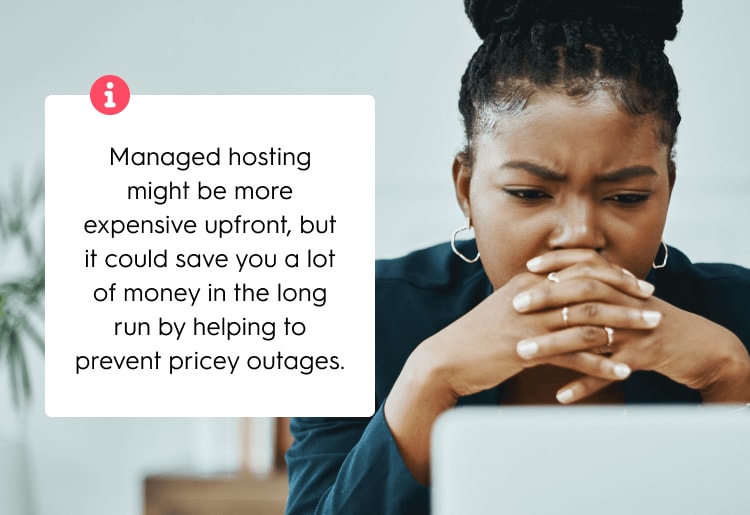As a web development and SEO specialist, I've seen how this decision impacts the efficiency and growth of online platforms. There are 311 million internet users in the US.
If you want to reach them and keep them on your website, you need a reliable hosting service that controls traffic spikes and ensures your site loads quickly.
In this article, I'll explain the differences between managed and unmanaged hosting. This can help you choose a website that operates seamlessly and supports your business goals. You'll also be able to avoid common web hosting mistakes for optimum website performance.
» Looking to speed up page delivery? Try our best web hosting services for small businesses.
What Is Managed Hosting?
Managed hosting is a service where the hosting provider takes care of all the technical aspects of running a server for you. This includes security, maintenance, updates, and daily operations.
This option is ideal if you want to skip the hassle of managing servers and focus on core business operations. It's especially helpful if you're not tech-savvy or if your company doesn't have its own IT department. You'll get expert tech support and resources to make things easier.

What Is Unmanaged Hosting?
With unmanaged hosting, the hosting provider supplies the server and network, but you are responsible for managing and maintaining the server day-to-day. This option gives you more control to customize the setup, install software, and configure the hosting to meet your needs.
Businesses with IT staff capable of server administration typically choose unmanaged hosting since they can organize the environment themselves. While it requires investing time and resources, it allows customization and autonomy at a lower cost for those with tech expertise.
Managed vs. Unmanaged Hosting: Levels of Support and Control
Managed hosting services, like DreamHost and A2 Hosting, provide comprehensive support, including help with technical issues, regular updates, maintenance, and customer assistance. It also gives you access to premium resources for troubleshooting to reduce the likelihood of prolonged downtime.
In contrast, unmanaged hosting comes with minimal to no IT support. It requires you to manage your server setup, upkeep, and any issues on your own. This could increase the risk of downtime, especially if your team can't identify the possible reasons behind a website crash or how to prevent it.
Considering that the cost of downtime averages at $5,600 per minute—or more than $300,000 an hour—it's clear that the stakes are high. Managed hosting might be more expensive upfront, but it could save you a lot of money in the long run by helping to prevent pricey outages.
» Find out how much website traffic a shared hosting plan can handle.
Managed vs. Unmanaged Hosting: Impact on Day-to-Day Operations
With unmanaged hosting, handling your server's setup, updates, and maintenance might require a dedicated IT team, making it a big part of your business operations. Managed hosting, however, takes these tasks off your plate by providing a stable service and excellent customer support.
The choice between managed and unmanaged hosting also affects how much stress you might deal with and how much you can customize your server. So, consider what kind of support and flexibility your business needs before deciding on a provider.
Managed vs. Unmanaged Hosting: Advantages and Limitations
Managed hosting works well for small and medium-sized businesses (SMBs), especially those looking for simplicity and support without many customization options. It saves time on upkeep and provides helpful customer service, which is perfect for companies without their own IT staff. However, it might come with higher costs.
On the other hand, unmanaged hosting is ideal for large enterprises, eCommerce projects, and startups with unique scaling requirements that need more control over configurations. This option is suitable if you have an IT team ready to take full command.
It offers you a chance to save money and lets you tailor the setup to your exact needs. However, it does require a sound understanding of how to oversee hosting effectively, which could consume a lot of time.
Managed vs. Unmanaged Hosting: Scalability and Flexibility
Scalability is key to growing your business, including your hosting needs. Managed hosting from providers like Bluehost and IONOS makes it easy to scale up since it offers higher plans with additional services and resources.
But spending more doesn't necessarily guarantee a better level of customization. Unmanaged hosting gives you total freedom to scale and customize your server, often at a lower cost. Yet, it demands significant technical know-how to use effectively.

» Discover why your growing website needs a dedicated server.
Choosing Between Managed vs. Unmanaged Hosting
Before settling on a provider:
- Determine your website's bandwidth requirements.
- Check how skilled your IT team is and if they can handle the technical demands of a hosting environment.
- Consider how much time and effort they can dedicate to managing the service.
- Factor in your company's size and budget.
Tech-savvy businesses, large companies, and eCommerce sites may lean toward unmanaged hosting for more control. In contrast, financial institutions concerned with security may prefer managed hosting from platforms like GoDaddy and Hostinger to ensure compliance.
Also, make sure that your provider prioritizes site speed since it can affect your conversion rates. Your website should load within one to four seconds so visitors want to take a specific action, like buying an item, signing up for a newsletter, or filling out a contact form.
» Ready to make a decision? Learn how to choose a website host.
Choose the Right Platform For Your Demands
Once you know how well your hosting can grow with your business and how fast it can adjust, you can decide between managed vs. unmanaged service. Think about whether you need to bring in an IT team or specialist to handle this. Also, look at how cost-effective the hosting plan is.
In the end, your choice should depend on your team's tech skills, your budget, and your business's expected growth, as planned out in your company's strategy. And if you already have a provider, you can follow these steps to change web hosting companies without losing important data.


